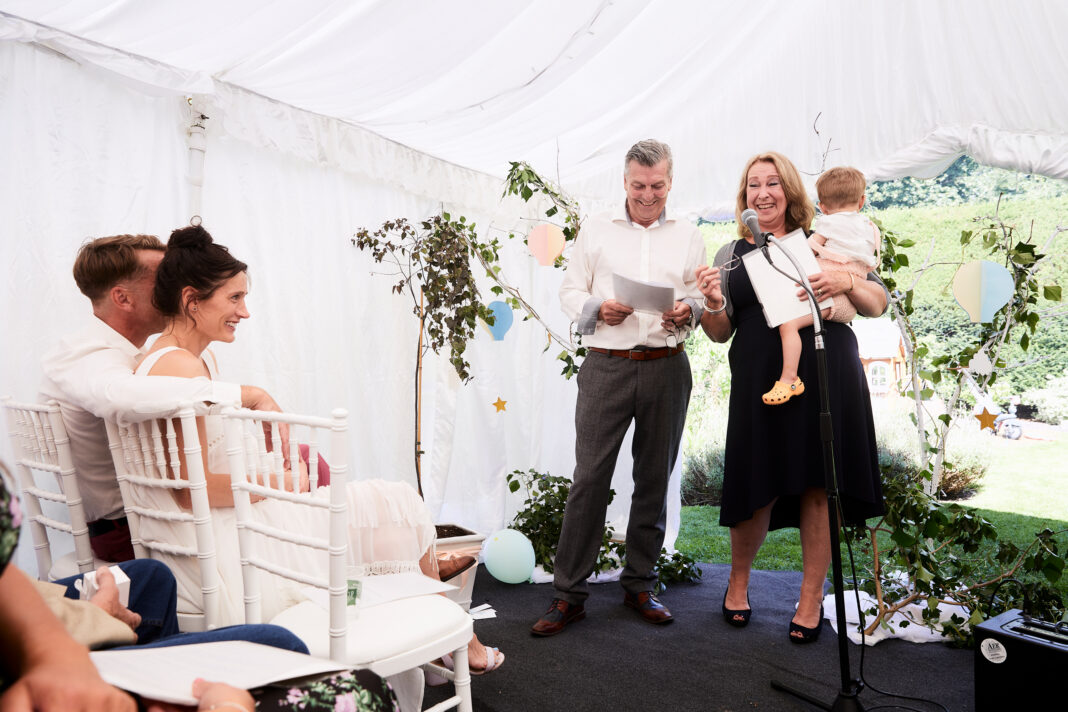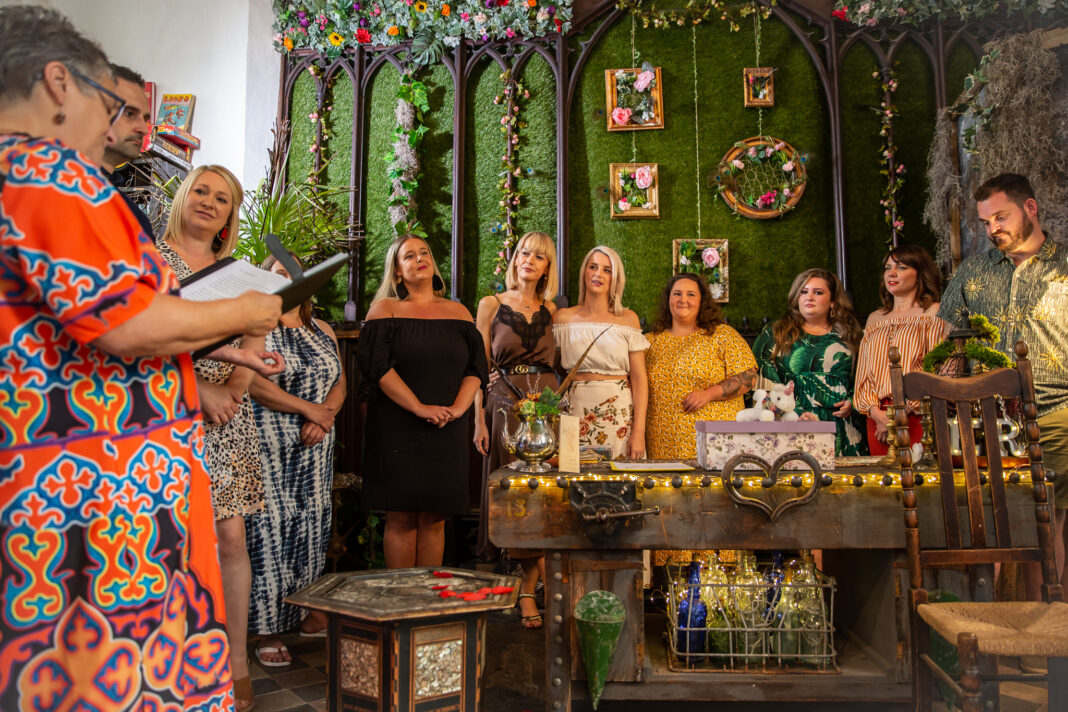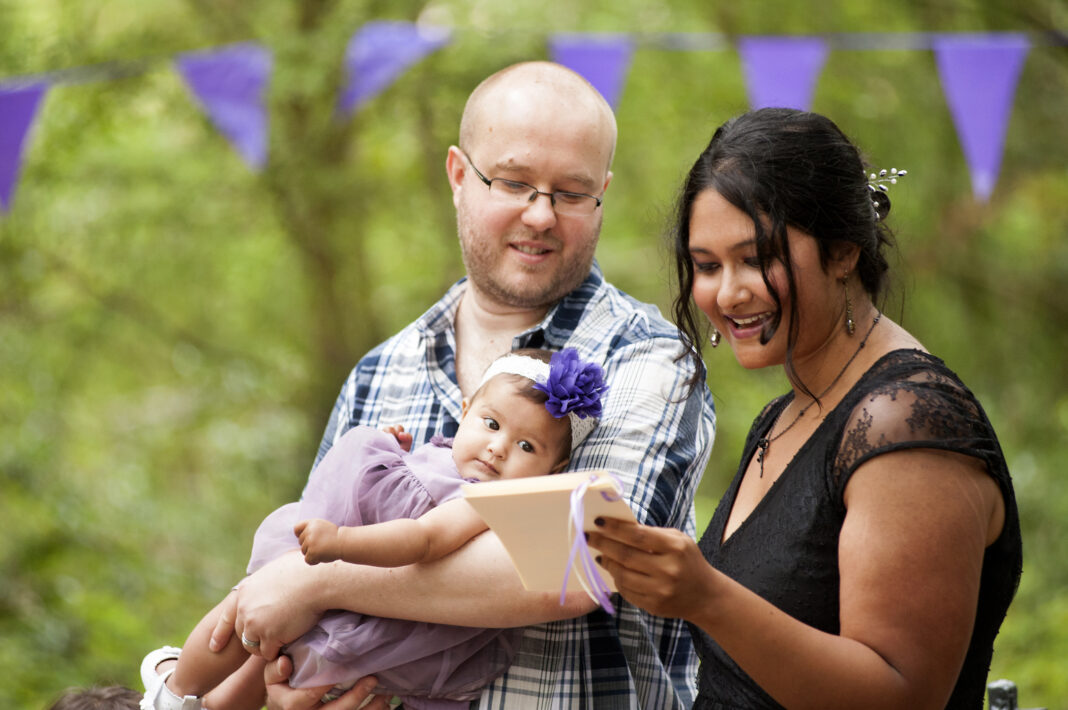A naming ceremony is an opportunity for you to welcome your child into your family and wider circle of friends. It’s also the perfect time for you to ask people close to you to become guide parents who will have an enduring supportive role in your child’s life. Find out more about the role of a guide parent during – and after – a humanist naming ceremony.

What is a humanist naming ceremony?
Throughout history, non-religious people have gathered together to mark life’s key milestones , and the arrival of a child into a family and the wider community is always a cause for celebration.
A humanist naming ceremony focuses on the uniqueness and individuality of the child, their potential, the support of family and friends to help them find happiness and fulfilment. A humanist naming ceremony is ideal for families who want to mark the occasion in a way that isn’t religious. For those gathered, it provides the chance for them to reflect the role they will play in the life of your child.
Today, more and more people are declaring themselves to be ‘of no religion’, and humanist naming ceremonies are growing in popularity as a way of celebrating and welcoming a new addition to the family.
What is a ‘guide parent’?
A guide parent is someone you invite to have an enduring relationship with your child. They could be considered to be the non-religious equivalent of a ‘godparent’, in that they both make promises to a child during a naming ceremony. However, at a humanist ceremony, the guide parents are not chosen to provide spiritual guidance: they are there to promise your child that they will always be in their life to offer love and support.
At the naming ceremony you may wish to invite the guide parents to make a promise together or to prepare their own personal promises to your child.
Alternatively, you could ask the guide parents to choose a song or poem to perform. Your celebrant can help you explore ideas about how to involve guide parents in the ceremony in a personal and meaningful way.
There is no defined role to being a guide parent – everyone is free to make of it what they will. But generally speaking, you would ask the guide parents to participate in the naming ceremony by making a promise to your child that they will provide emotional support to them as they grow up.
In the longer term, the guide parent’s role is to act as a role model for your child, and to provide support.
The role of the guide parent is NOT to become a legal guardian of your child in the event of your death. That is an entirely different matter.
How many guide parents can we have?
Having guide parents is entirely optional, but you can have as many as you like. The number you choose is up to you. Most ceremonies feature between two and six guide parents, but ten is not unknown!

In terms of the make-up of the number of guide mothers and guide fathers, it’s entirely up to you. There are no rules on gender balance: there are no rules at all. It’s your day, your way.
How do we choose guide parents?
You may wish to consider which of your friends hold a meaningful place in both yours and your child’s life. Ask yourselves, ‘Who would provide the best support and advice to our child?’ Or, ‘Who would remember their birthday and bring fun into their life?’
What other names can we use besides guide parent or godparent?
We tend to call them ‘guide parents’, but from ‘Fairy Godmothers’ to ‘The Odd Parents’, our celebrants have seen and heard it all.
The words ‘guardian’ and ‘mentor’ are sometimes used to describe this role, but they each have their own connotations, so it’s a good idea to be clear of the role you want your friend to play before asking them.
The word ‘godparent’ is still sometimes used because it’s a term people understand, but it can create confusion amongst guests at a non-religious ceremony.
Other terms families choose are:
- Sparent (as in ‘spare parent’)
- Godless parent
- Honorary aunt and uncle
Where can we have the ceremony?
Naming ceremonies, like christenings, have no legal basis, there are no restrictions on their location. A humanist naming ceremony can be held wherever you like (within reason) – at home, in the garden, in a park, at a hotel, or at your local community centre. Feel free to use your imagination! We’ve even held a naming ceremony at a zoo and in a decorated woodland glade.

How do we find our local celebrant?
The role of the naming celebrant is to help you create a personalised ceremony that is meaningful to you. Let your creativity flow, and co-create the perfect day to celebrate your child.
The first step is to find your naming celebrant. They will be happy to discuss your unique celebration.
Further reading, tips, and ideas
- What is a humanist naming ceremony?
- What happens at a humanist naming ceremony?
- What’s the difference between a christening and a naming ceremony?
- Ten ideas for your child’s naming ceremony
- Naming ceremonies | Non-religious rituals and symbolic actions
- Poems for a humanist naming ceremony
- A socially distanced naming ceremony
- Frequently asked questions





